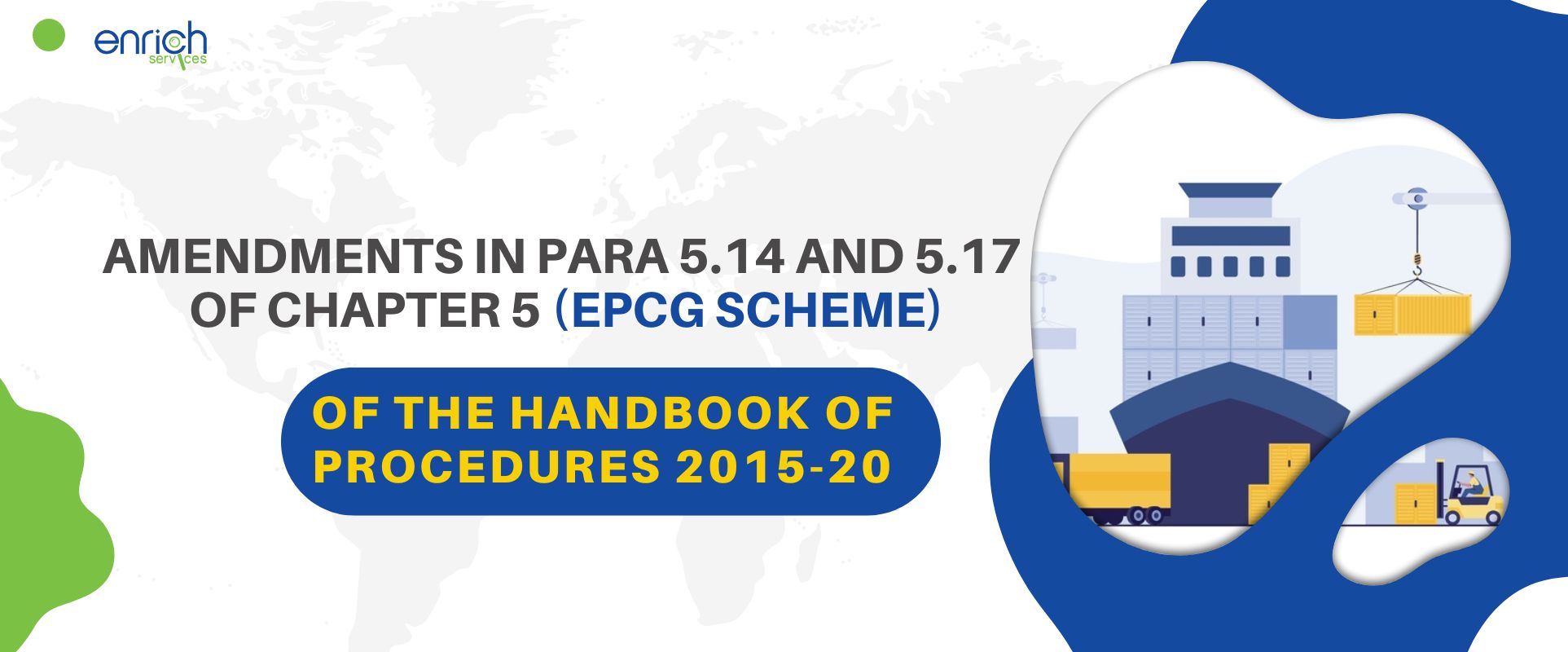Amendments in Para 5.14 (c) and 5.17 (d) of Chapter 5 (EPCG Scheme) of the Hand Book of Procedures 2015-20

Introduction
If you want to be a person who knows it all about the Exports Promotion Capital Goods (EPCG) Scheme especially if you want to learn how to reduce compliance burden and enhance the ease of doing business, then you must refer to the amendments present in chapter 5 of the Handbook of Procedures (HBP) 2015-2020.
In this particular chapter, you will find everything you have been searching for and more. The Handbook of Procedures contains every piece of information that you will need to know to obtain a better picture of the export obligation. Over the last couple of years, there have been a few changes in the provisions of chapter 5 of the EPCG Scheme.
If you go through Para 1.03 of the Foreign Trade Policy (FTP) 2015-20 you will realize that the things stated in it are amended from time to time. The following amendments in chapter 5 of the Handbook of Procedures are made by the main authority that is the Directorate General of Foreign Trade (DGFT) by the means of immediate effect. The amendments stated in the book are applicable for EPCG authorizations that are issued under the Foreign Trade Policy 2015-20.
What are Amendments in Para 5.14 (c) and 5.17 (d) of Chapter 5 (EPCG Scheme) of the Handbook of Procedures 2015-20 all about?
I) Block-wise extension of export obligation period EPCG : –
When we talk about the amendment in Para 5.14(c), we can see a crystal clear difference between the existing provision and the previous provision. In the past, for the block-wise fulfillment of the export obligation, if the export obligation was not fulfilled as per the prescribed proportions, the export obligation period could be extended by the regional authority subject to payment of a composition fee of 2% on duty saved amount to the unfulfilled portion of the export obligation to a particular block. It was essential for the authorisation holder to apply within 3 months from the expiry of the block for block-wise period extension.
According to the revised provision of Para 5.14 (c), the request for extension of the export obligation of the first block period shall be submitted to the authority within 6 months from the date of expiry of the first block export obligation period, and that too with a composition fee of 2 percent on duty saved amount proportionate to the unfulfilled portion of export obligation about the specific block.
RA may consider the request for extension of block wise EO period, received after 6 months, but within 6 years from date of issue of authorization, with a late fee of Rs. 10,000/- per authorization. Application made beyond 6 years, for extension of block-wise EO period for regularization purpose, shall also be considered by RA concerned, with an additional late fee of Rs. 5,000/- for each year per authorization. This late fee is in addition to the composition fee that may be payable on account of shortfall in export obligation. Where EO of the first block is not fulfilled in terms of para (a) above, except in cases where the EO prescribed for first block is extended by the Regional Authority, the Authorization holder shall, within 6 months from the expiry of the block, pay duties of customs (along with applicable interest as notified by DOR) proportionate to duty saved amount on total unfulfilled EO of the first block.
II) Extension of export obligation period EPCG: –
Let’s ponder over the Para 5.17 (d), previously here the request for extension of the export obligation period could be submitted to the regional authority within 90 days from the date of expiry of the original export obligation period and the authority would consider the request for extension of the period of export obligation up to 180 days along with a composition fee of Rs. 5000.
However, DGFT has been revised the existing provision that the request for extension shall be made to the regional authority within 6 months from the date of expiry of the original export obligation period.
However, RA may consider the request for extension received after 6 months, but within 8 years from date of issue of authorization, with a late fee of Rs. 10,000/-. Application made beyond 8 years, for extension of EO period from 6 to 8 years for regularization purpose, shall also be considered by RA concerned, with an additional late fee of Rs. 5,000/- for each year per authorization. This fee is in addition to the composition 1ee that may be payable on account of shortfall in export extension, beyond 8 years from date of issue of authorization, shall not be allowed by RA under this provision EPCG
Conclusion
I would suggest that before you step into the big world of export obligation fulfilment and its period extensions or even indulge in any kind of process related to the export obligation make it a point to garner as much information about the entire process of export obligation and its period extension as possible as it will help you a lot in the long run.
Let me tell you one thing being a person with a plan in hand is always better than being someone who has no clue about what’s going on at the moment. The process of export obligation period extension is somewhat full of small steps so before starting the procedure be fully versed with each little detail of the procedure as you would not like it if things don’t pan out the way you wish and hope them to.
Top DGFT Consultants in Hyderabad
Authors Bio:-

